Jon Voight National Treasure Book of Secrets Interview
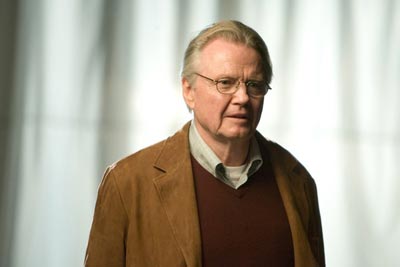
VETERAN VOIGHT TAKES ON TREASURE AGAIN
EXCLUSIVE by Paul FischerOscar winner Jon Voight has been making an impact on movie audiences for close to 40 years, starring in such iconic classics as Deliverance, Midnight Cowboy and Coming Home. Some 60 films later, Voight is still going strong and will next be seen as Ed Nortons cop father in the thriller Pride and Glory. But prior to that, Voight reprises his role of another dad, that of Nic Cage in the National Treasure sequel Book of Secrets, which he manages to steal, alongside Helen Mirren who plays his ex-wife in the action adventure. The actor talked exclusively to Paul Fischer.
Paul Fischer: We're you initially reluctant to do a sequel to National Treasure?
Jon Voight: No, no I was not. I'm very grateful when Jerry calls me about anything. I count my blessings and one of my great blessings at this time in my career has been Jerry Bruckheimer. Very fortunate to be in his stable.
Paul Fischer: Did you know that they were going to really expand your role and give you a lot to do? Or did you say, "Okay, you know, whatever you want me to do, I'll do it." Basically.
Jon Voight: Well yeah. Pretty much I would say that. But this time, Jerry saw me a couple years ago ironically at the Emmies where Dame Helen Mirren won. Jerry just came up to me and he said, "We're gonna do a sequel and you've got a nice piece of it. And it's a little bigger role Jon, a much expanded role. More to do." I said, "Gee, that's nice news Jerry. Great." You know? But you never know. These things could fade quickly in this business. You never know whether it'll come to reality. But it did. And I was very grateful to get that call. To say, "We're gonna shoot this and this. Put this date aside. And let's go."
Paul Fischer: When you have so much physical stuff to do, and you're not a young man anymore. I mean how nervous are you to do a lot? Or do you just dive in?
Jon Voight: I love the physical stuff. I've always loved it. I hope I stay well enough to do. I was a big fan of Lawrence Olivier's and he was gonna do King Lear and he had terrible arthritis, prostate cancer and a whole bunch of other things. And he had to carry Cordelia, so they rigged these wires so that he could carry his daughter. And he was one of the most athletic of the stage stars from England, having made a reputation of doing very physical stuff on stage. And in films too. And I hope that I would just continue. I feel the same-- I love to do these spectacular physical things if I can do them.
Paul Fischer: Is this one of the better acts in your career for a while? I mean do you feel a sense of almost rejuvenation in a way in your career?
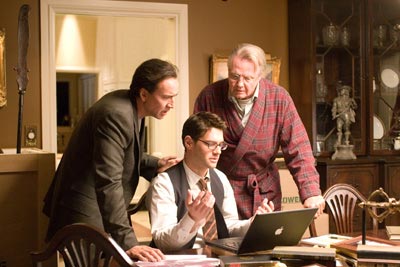 Jon Voight: Well I'm very fortunate. I'll tell you. And I'm having a good time. I'm working with great people. And I'm, you know, doing great projects. So it is a kind of a renaissance for me.
Jon Voight: Well I'm very fortunate. I'll tell you. And I'm having a good time. I'm working with great people. And I'm, you know, doing great projects. So it is a kind of a renaissance for me. Paul Fischer: This movie is a very old fashioned kind of entertainment. You don't get to see very often. How surprised are you that Jerry Bruckheimer who had a reputation-- that makes films that are obviously a variety of films is willing to do something like this?
Jon Voight: Well is this a Jerry Bruckheimer film? You bet it is. It's-- the action sequences in this film are just as good as any action sequences in any other film I've ever seen. It's just terrific stuff. I mean the run through London is just unbelievable. Brilliantly done. And that's great. And then there's of course, there's humor in this. What Jerry does, Jerry takes pictures he likes, themes he likes, or you know, whatever, some idea. He says "let's go." And he puts a bunch of writers onto these projects to get them going. And then he gets a director that he likes. In this case, with this film he found John Turtletaub. John Turtletaub has a wonderful sense of humor. He's a very loving man, John, and has a certain, you know, has all the other equipment too, he's got a great visual sense and he's just got good tastes.
But he has this real sense of humor. And a strong sense of humor. So when they put this thing together, he was gonna be the ingredient, he was gonna be the horse for Jerry. He says "I'm backing this guy." And when Jerry does that, he let's the director play. He supports the director. He doesn't smother anybody. That's one of his successes. He hires people and he helps them. So this is a John Turtletaub film.
Paul Fischer: You know, you've been doing this obviously a long time now. And almost 40 years I guess since Midnight Cowboy put you on the map. How has Hollywood changed the most in your view?
vWell when I came into Hollywood it was already changed the most. The great movies of the '40s and '30s were starting to unravel in the middle of the '50s. The studio system was disappearing. And when I came into it, I came into it as an artist. I just wanted to do something that was-- I wanted to say things. You know? And there were a lot of people in my group that wanted to do that. And we looked at the situation in Hollywood at that time and it wasn't surefooted. They were in lots of doubt. They didn't know which way to go. They were rehashing what had been done before.
So our group, our generation took the helm a little bit. Or the artists were looked to create excitement for the audience. And that's why you had Bonnie and Clyde as one of the first ones. Then you had Midnight Cowboy in there and then all of the great work of Coppola. Hal Ashby. Scorsese. These guys came forward and took the reigns. And the studio-- the money people from the studio backed those guys. It became a different system. And then of course it became-- it moved into a lot of more muscle. Then it became Spielberg. And it passed through the, you know, the action pictures. Pure action pictures. With a lot of muscle like Schwarzenegger. And real literal muscle. With Stallone and Schwarzenegger and Willis. Those things.
And partially because it was competing with television, it seemed that movies were more and more, had to be more and more spectacle. More and more, you know, extraordinary. And probably distorted a little bit. So the real stories like, and you look back in the '30s and the '40s, they were stories. They took their time telling stories. They were stories about people. A little more intimate. Now everything had to be spectacle. And that was the big change. But still artists are artists. And there are great movies made every year.
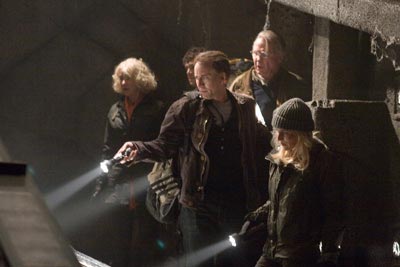 Paul Fischer: Do you find yourself very choosy when you take a role, or you just grateful for work?
Paul Fischer: Do you find yourself very choosy when you take a role, or you just grateful for work? Jon Voight: Well I try to choose the things that I think I would want to see and things that are relevant. Things I want to say to this generation of kids. So a lot of it is focused on kids I must say.
Paul Fischer: You recently did a movie where you play Ed Norton's father.
Jon Voight: This is coming out in March.
Paul Fischer: He is a real interesting guy.
Jon Voight: He is.
Paul Fischer: What was the experience like working with talent like that? And what do you take from that experience?
Jon Voight: Well he's a very good actor and he's a very smart film actor as well. He has his own method of protecting himself and he's got very strong feelings. He's a director. He has a real directors bone in his body, so he tends to want to get into that area as well. He's quite an interesting guy. I found him to be someone with, you know, like-- I found that we had similarities.
Paul Fischer: You played a cop in that right?
Jon Voight: Yeah.
Paul Fischer: Was it fun to do that?
Jon Voight: It was yeah. You know what was fun about that movie? Is because I was doing a New York character. I am from New York. I'm from Yonkers, New York. I spent ten years in the city after growing up. And I'm a New York actor. At the bones of me is a New York actor. I was trained in New York. I was trained by people from New York, from that culture. And it is a culture. So when I went back to do that movie I felt a kind of a homecoming. It was nice to be back in that kind of milieu. And I have to say that the actors, all New York actors, were fantastic. All of them. Except for Colin Farrell, of course is not a New York actor. But he's fantastic. I'm crazy about Colin too.
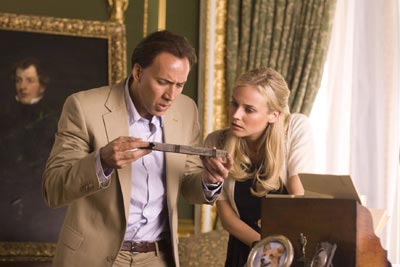 Paul Fischer: Now are you signed up for sequels to either this movie or Transformers.
Paul Fischer: Now are you signed up for sequels to either this movie or Transformers.Jon Voight: No. Am I signed up for new versions of these pictures?
Paul Fischer: Yeah.
Jon Voight: No, not at the moment. I would take them.
Paul Fischer: Have you heard whispers?
Jon Voight: If they'd offer me. I think there is a Transformers movie. I don't know whether I'm gonna be called. I don't know whether they'll have a role for me. But if they do, I'll be there. If they revive my role I will be there.
Paul Fischer: What are you up to now? What else are you doing?
Jon Voight: I'm working on a thing called Uninvited. Which is a film that I've been kind of working on a little bit over the years. And it seems like we have a wonderful director and I think that it's gonna go forward very quickly, so I'm waiting for the script which should be coming this week.
Paul Fischer: Will you ever go back to the stage?
Jon Voight: I doubt it. I think that with time, as I get older, I don't have the time to spend on stage because I can reach more people with film. And it's better for my scheduling. I can do more activities. When I'm on a stage, in a stage production, it kind of consumes me. And I can hardly do anything else but do that performance at night. I can't just-- I prepare for it during the day. I mean that's the kind of guy I am on stage. So I'd rather not. I'd rather do film. I can take those breaks in a film schedule and do all the other things that I'm doing. I do a lot of charity work. I do a lot of, you know, other things.
Paul Fischer: What are your priorities at this stage of your life?
Jon Voight: Well I think that we're at a time in our country's history where I think there's a big thing going on. You know? We're at war. As we're talking right now, we're at war with a very pernicious enemy. A very dangerous enemy that is waging a war of propaganda. And it's a totalitarian enemy. A theocratic totalitarian enemy, right? It's as dangerous a time as 1941. And that's where I'm focused. I want to make sure that the people who have the freedoms that we have understand the value of them and cherish them and protect them and pass them on to the next generation. That we don't lose this war.
Nicolas Cage National Treasure Book of Secrets Interview - www.femail.com.au/nicolas-cage-national-treasure-interview-book-of-secrets.htm
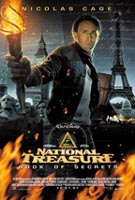
National Treasure Book of Secrets
,b>Starring: Nicolas Cage, Diane Kruger, Harvey Keitel, Ed Harris, Jon Voight, Justin Bartha, Helen Mirren, Bruce GreenwoodDirector: Jon Turteltaub
In this follow up to the box-office hit "National Treasure," treasure hunter Ben Gates (Nicolas Cage) once again sets out on an exhilarating, action-packed new global quest to unearth hidden history and treasures.
When a missing page from the diary of John Wilkes Booth surfaces, Ben's great-great grandfather is suddenly implicated as a key conspirator in Abraham Lincoln's death. Determined to prove his ancestor's innocence, Ben follows an international chain of clues that takes him on a chase from Paris to London and ultimately back to America. This journey leads Ben and his crew not only to surprising revelations - but to the trail of the world's most treasured secrets.
National Treasure out on DVD
Order Now from Chaos
Order Now from Sanity
MORE
- Viggo Mortensen The Road
- 24 Cast Reunion
- Aaron Eckhardt No Reservations
- Aaron Eckhart The Dark Knight
- Adam McKay Step Brothers Interview
- Alan Alda Diminished Capacity Interview
- Alan Alda Diminished Capacity Interview
- Alex Dimitriades
- Al Pacino Oceans 13
- Alan Rickman Snow Cake
- Alan Rickman Sweeney Todd



